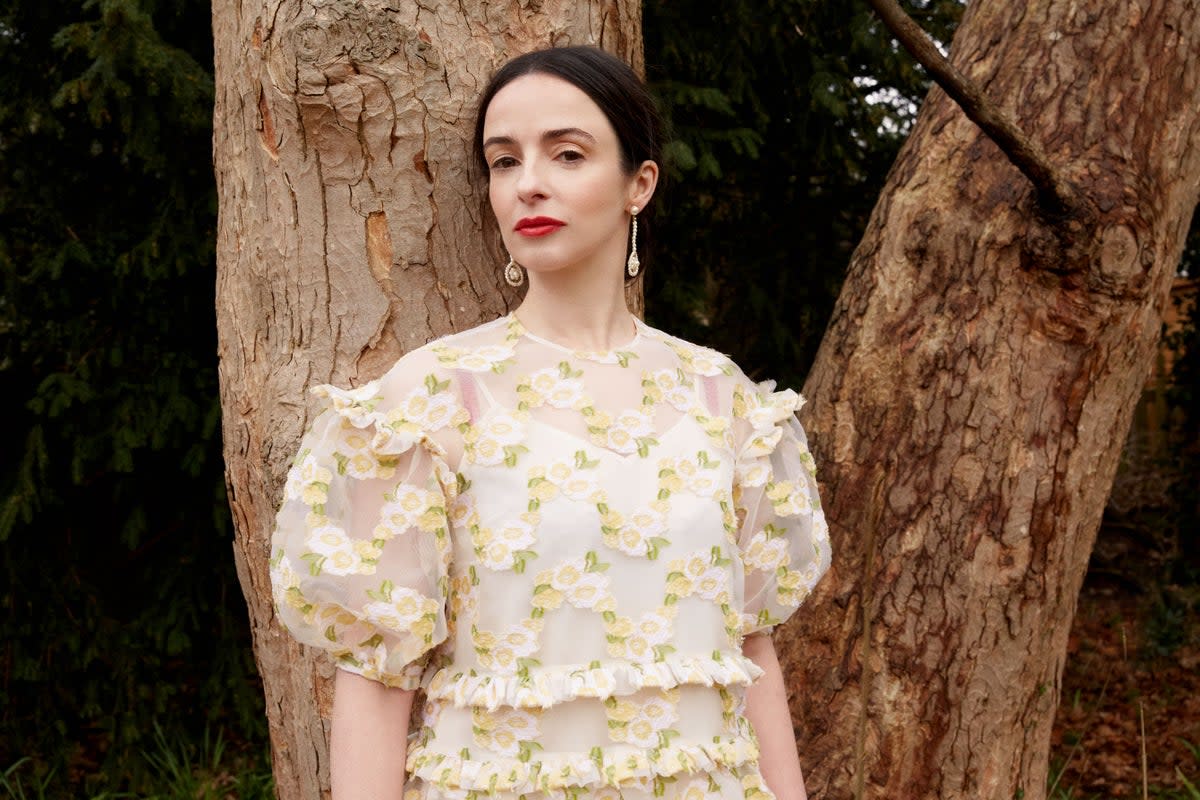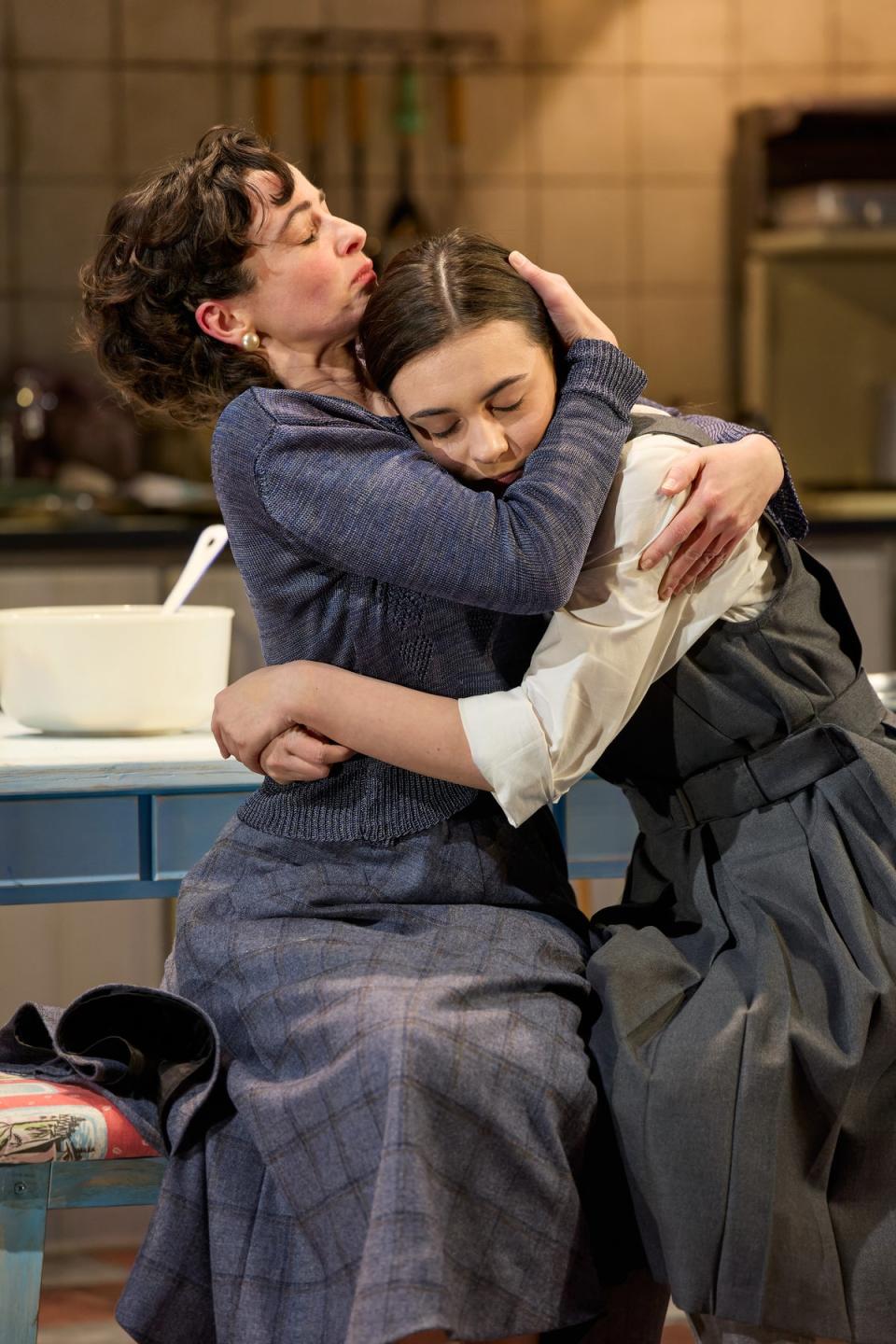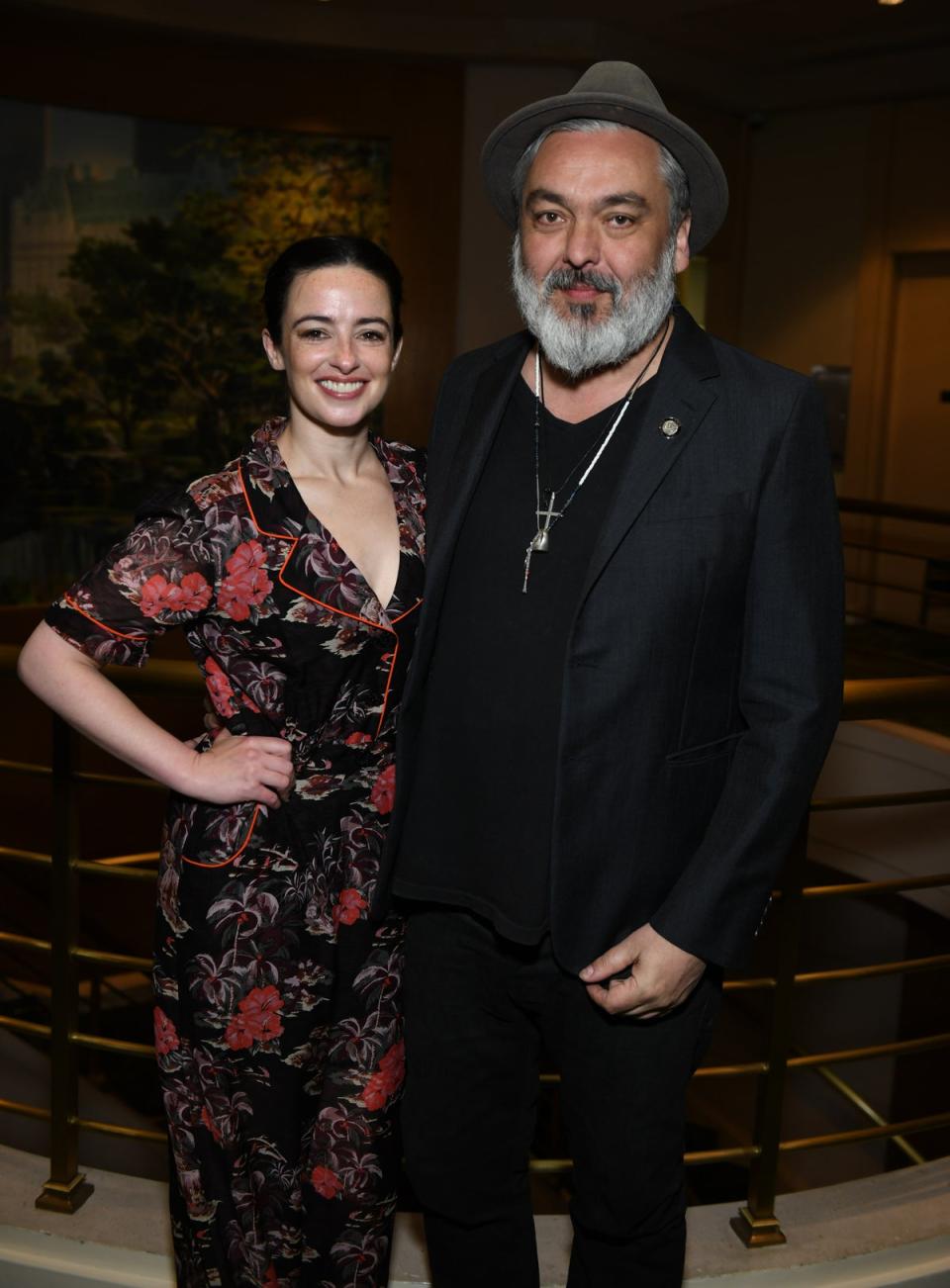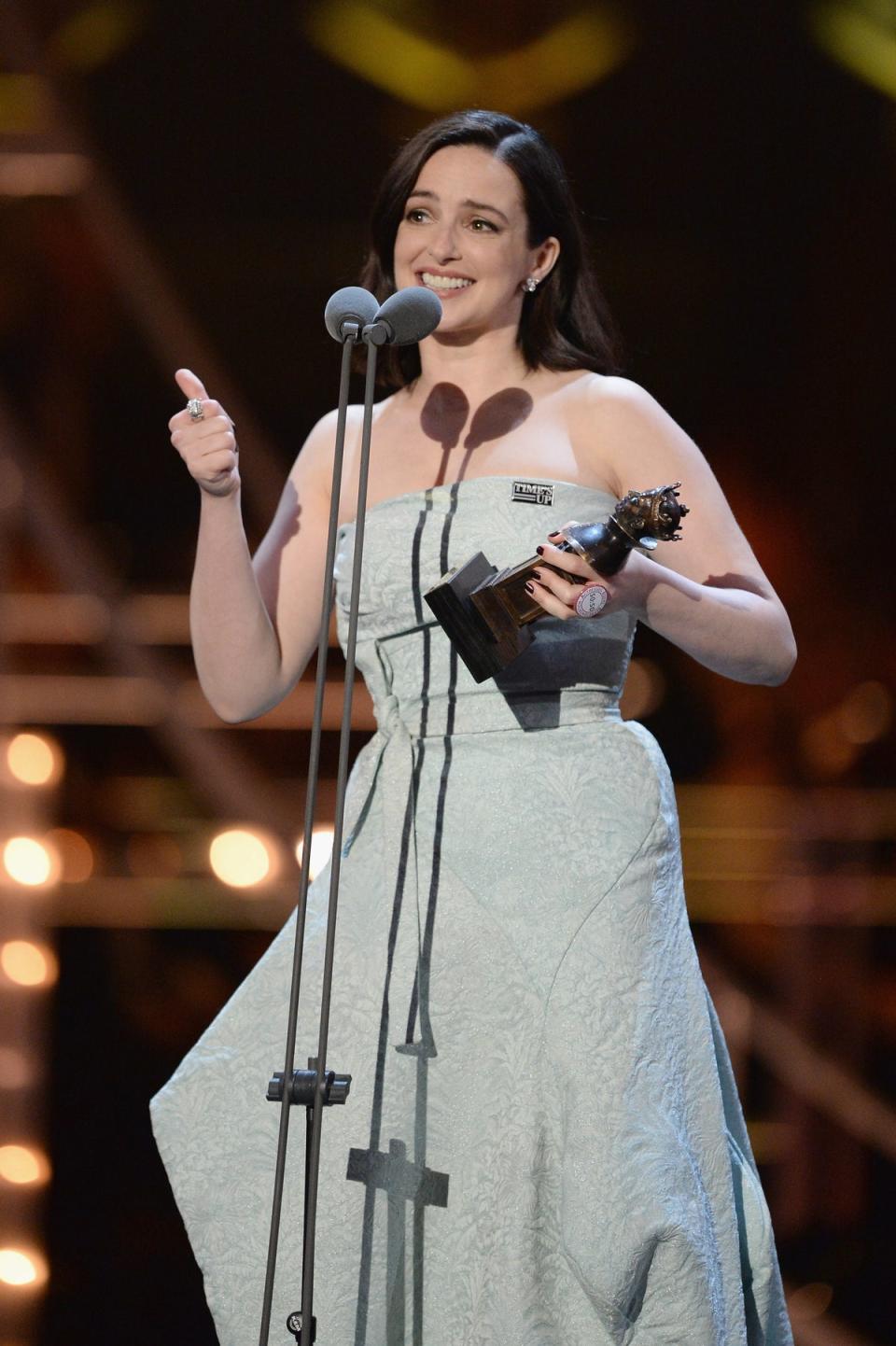Meet Laura Donnelly: Jez Butterworth’s leading lady and star of West End smash The Hills of California

Laura Donnelly didn’t finish work until late last night. That’s because her partner, Tony winner Jez Butterworth, has written a three-hour play, and she’s in it. Does she ever tell him off for making them so long? The Belfast-born star, cradling a coffee in the Ham Yard Hotel’s conservatory, lets out a long, languorous chuckle. “I did, literally the other night. I was like, can the next one be 80 minutes please?”
The play is The Hills of California, and it’s an event. Butterworth is frequently cited as Britain’s leading playwright, his 2009 play Jerusalem theatre’s defining 21st-century work; Donnelly has been the hypnotic, tender heart of his stage writing since 2012. That was the year they met and fell in love. She had been cast in The River, which was more of a spell than a play, and saw Dominic West (and later, on Broadway, Hugh Jackman) gut a real fish on stage.
In his next play, in 2017, Butterworth took a piece of Donnelly’s family history – the IRA “disappearing” of her uncle in 1981 – as inspiration for The Ferryman, a muscular epic full of violence and foreboding, which became the Royal Court’s fastest selling show in history. It also won Donnelly an Olivier award and a Tony nomination for her starring role. Now, straight into the West End comes The Hills of California, directed, like The Ferryman, by Sam Mendes. The reviews have, by and large, been very positive, with words like “masterclass” and “masterpiece” bandied about.
These days, Donnelly and Butterworth live in a house full of books with their two daughters, who are aged six and seven. He writes plays. She stars in them. They’ve become one of theatre’s most formidable partnerships; “British theatre’s coolest power couple,” Vogue calls them. This kind of stuff makes Donnelly, 41, laugh in a slightly embarrassed way. “We’re genuinely considering having a big public breakup where we really bitch about each other, just to make it more interesting. ‘We’re still gonna work together… but we haaaate each other,’” she jokes. In truth, collaborating feels “really ordinary” to them, but – like any actor – she’s grateful for the work. “I know that every actor under the sun would like to be in a play of his. And the fact that, when he thinks of what he’s going to do next, he automatically has me in mind – I feel incredibly privileged to be in that position.” Even so, it’s a “very domestic, very ordinary life”. “I get frustrated at him leaving the cap off the toothpaste, all that stuff,” she shrugs.
We’re talking while the show is in previews. Donnelly in a berry red jumper, her face makeup-free before another day of rehearsals. She’s clearly exhausted, and not seeing Butterworth or their daughters much during this intensive early period, but her eyes are like bright, round lamps, her conversation open and easy. (And she’s surprisingly tiny when she stands up.) This time it was Butterworth’s life that informed the play: The Hills of California came partly from his experience of saying goodbye to his sister, who died of brain cancer in 2012, at the age of 46. It’s split into two time periods: when the teenage Webb sisters are being sculpted into dance stars by their formidable mother Veronica (played by Donnelly) in the kitchen of her Blackpool B&B, and when they return, years later, wondering how to face her as she lies dying upstairs.
Like the B&B itself – named Seaview, even though, as one guest notes, “you can’t see the sea view” – it’s a play about faded glories and dashed hopes, big dreams and missed opportunities. As Veronica, a commanding drill sergeant with a brassy Blackpool brogue, Donnelly has never been better. For the role, she drew on the cult BBC documentary Three Salons at the Seaside, which eavesdropped on northern pensioners getting perms. Plus, she says, a small smile forming at the side of her mouth, “I don’t know if I should admit this… but a little bit of Shirley Ballas. Because she is dance, she is showbiz in that Blackpool northern sense.”
I saw comedy queens like Victoria Wood and Caroline Aherne in Donnelly’s performance, as well as a bit of status-conscious Mrs Bennet from Pride and Prejudice. But Veronica is not the typical pushy showbiz mum. “I want them to live! I want them to soar!” she declares, with a poignancy evoked by the suspicion she wants them to have the life she couldn’t. “She really wants them to have magical lives. And I think parents can relate to that, for good or bad. I mean, there’s a part of me that just wants my children to have very ordinary lives,” Donnelly admits, mentioning the poem Philip Larkin wrote for his niece, “Born Yesterday”, in which he wishes her an average, happy life.

Donnelly plays a crucial role in the genesis of Butterworth’s plays. Ideas are discussed over breakfast, at the dinner table. “He’ll usually keep me very up-to-date, the whole way. But it’s really just so that he can get ideas out of his head and bounce them off me a bit.” I wonder if they ever tease each other about what he’s written for her to do. Like, as per The Ferryman, grieving her murdered son eight times a week? “Yeah, I have to burst into tears spontaneously three times in a play?!” she says. “I’ve definitely had a few moments that are like, ‘I cannot believe you’re making me do this.’” (This time around, she “started cursing him” when he wrote scenes where she must simultaneously talk and play the piano. Difficult, in front of hundreds of people, when you don’t actually play.)
Life is something Donnelly tends to think of as “pre-The River and post-The River”, so transformative was that 2012 production for her. Not just because of meeting Butterworth, but thanks to the work she did with him and director Ian Rickson. The play was an eerie, unique chamber piece, performed in the Royal Court’s small upstairs space; tickets were hard to come by, audiences were tiny. It was work without commercial pressures, and which the writer and director took seriously, enabling Donnelly to do that too. “I think up until then I’d allowed a bit of cynicism about what I did for a living. Maybe a part of me internalised an old Northern Irish teacher’s advice of ‘it’s a silly thing to be doing, get your head out of the clouds’.” By the end, Donnelly was “so completely changed in every way”.

Given how it borrowed from her life, The Ferryman was another intense experience. Donnelly’s uncle went missing on New Year’s Day in 1981 at just 26; he had been murdered by the IRA, but it was three years before his body, left in a bog, was discovered by a dog walker. A similar incident drives the play’s drama. For Donnelly’s mother, going to see it was painful but cathartic. “She was incredibly proud that this story was being told.” Something about the play seemed charged: other family members of the Disappeared came to see it, including the niece of a man still missing. A few days after she’d watched it, he was found – and his name was Seamus, just like the murdered man in the play. “Things like that tend to happen around Jez’s plays,” says Donnelly.
What also made the performances draining was that Donnelly was pregnant with the couple’s second child – seven and a half months by the end. “At the beginning, it wasn’t so fantastic, because I was literally being sick into a bin at the side of the stage and napping during the interval.” But later, it put the stresses and pressures of opening a big play into perspective. “Now it’s just lovely to know my daughter was with me during that.”
Donnelly admits that, when she first became pregnant, she panicked about what it might mean for her career. “I had just finished a TV show that I was, ah…” – she laughs – “not feeling great about. The first episode came out the same week that I found out I was pregnant, and I watched it and just knew that was not what I’d signed up for.” Nor was she feeling enthusiastic about another project she had lined up. “So I was very worried.” It spurred Butterworth into finally writing a play he’d long been talking about – and that play was The Ferryman. When her and Butterworth’s eldest daughter was a few weeks old, the actress had a brilliant role ready and waiting. She looks back now and understands that life is full of ups and downs – but she didn’t know that then. “It’s not an industry that has traditionally been very kind to women as they get older, as they have their families. We can’t always afford to take time out. We worry about being forgotten.”

For all her triumphs, Donnelly has had disappointments, too. After The Ferryman, she was cast in Joss Whedon’s HBO series The Nevers, about a group of Victorian women with unusual abilities. It was her biggest screen role yet. “That was my dream come true TV job. I was getting to do this very complex multi-layered character, I was doing all my own stunts, wearing amazing Victorian costumes.” But then, something she refers to as “our PR nightmare” – Whedon abruptly left the show amid allegations of misconduct from actors on other projects – “sunk it”. It was not renewed for a second series. “The whole thing went down the tubes,” she says. Her voice gives a small hint of how bruising it was. “It was devastating. I think I can speak for the entire cast and crew. We were just loving what we were doing.” The disappointment took her “a while to get my head around”, but taught her a valuable life lesson: some things are beyond your control.
It’s not an industry that has traditionally been very kind to women as they get older, as they have their families
Donnelly’s TV work has included the first series of The Fall (Jamie Dornan murdered her), Starz show Outlander and druid drama Britannia (written by Butterworth and his brothers Tom and John-Henry), though she’s not had a major breakthrough there yet. It’s surprising. But her screenwork has never made use of her talents in the way that theatre has, even in an era when great roles for women are supposedly on the rise. She admits that in our age of seemingly infinite TV, the quality of scripts she sees varies greatly, so she works less than she could, because “to take that time away from my kids, to do 12-hour days, to put my blood sweat and tears into something, that has to feel really worth it. And that stuff doesn’t come along for me hugely regularly.”
A positive: Butterworth’s plays are known for attracting starry crowds. Donnelly got the role in The Nevers after Whedon watched The Ferryman. Daniel Day-Lewis and Frances McDormand came to see The River, after which McDormand stalked the corridors to meet her and co-star Cush Jumbo. “I remember hearing her going, ‘Where are the women? Where are the wonderful women?’” Donnelly says, putting on a kind of passionate American wail. She isn’t sure what’s on the horizon – and is suspecting her time with The Hills of California may not end, as dates currently suggest, in June. Perhaps her next role will depend on who, exactly, has booked a ticket.
‘The Hills of California’ is at the Harold Pinter Theatre until 15 June


